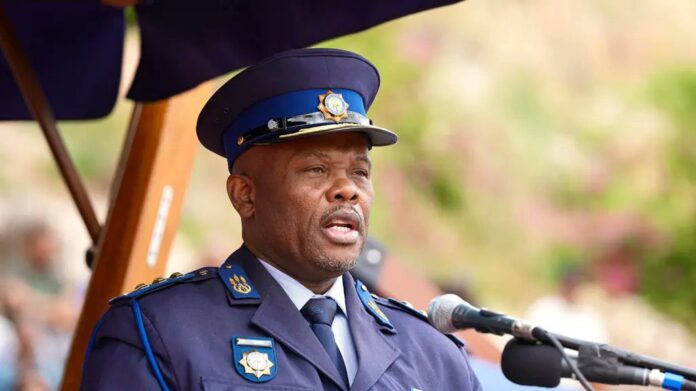There was a heated legal battle at the Pretoria High Court on Wednesday as suspended deputy national commissioner for crime detection, Shadrack Sibiya, sought to have his suspension declared unlawful.
The court, presided over by a full bench that included Judges Nomonde Mngqibisa-Thusi, Graham Moshoana, and Dennis Davis, heard arguments from the legal teams of Sibiya and national police commissioner General Fannie Masemola.
Sibiya’s lawyer, advocate Kameel Premhid, challenged the legitimacy of the suspension, arguing that Masemola overstepped his authority.
“The national commissioner Masemola didn’t have the power to do this. My client was not provided an opportunity to get representation after the order,” Premhid stated.
“Every time my client tries to defend himself, he’s met with resistance. He’s embarrassed to be put on a stay-at-home order for allegations that are not credible.”
121 investigative dockets
Premhid further questioned Masemola’s motives.
“If Masemola says he has to discipline Sibiya, is it because he wants to be at the centre of the disciplinary proceedings?
“Let’s give him the benefit of the doubt that he doesn’t, but then why is he not allowing the commission to handle the disciplinary proceedings? With all due respect, that’s something this court should not allow.”
The court questioned Premhid about a dispute involving 121 investigative dockets, with Davis pressing Sibiya’s team on the matter.
“What does he say about the 121 dockets?”
“Is he supposed to say anything? I’m struggling to understand the question. The matter is a disciplinary issue, and he wouldn’t have had a say because my client was asked to stay at home. He cannot say anything because he is currently at home.”
According to Premhid, while Sibiya was still working, he had instructed the dockets to be returned to KwaZulu-Natal, a move Masemola supported but which was opposed by KwaZulu-Natal top cop, Lieutenant-General Nhlanhla Mkhwanazi.
While Davis pointed out that the stay-at-home order had no impact on Sibiya’s salary, benefits, or security, Premhid underscored the harm the suspension inflicted to his reputation.
Integrity of investigation
Masemola’s lawyer, advocate Stefan Coetzee, countered that the suspension was necessary to preserve the integrity of an ongoing investigation into the serious allegations.
“This court cannot say if the allegations made by General Mkhwanazi were false or not, but we can say they are serious,” Masemola’s lawyer argued.
“A preliminary investigation was done, and a notice was sent to the applicant [Sibiya] of a possible suspension transfer. This application is premature and is done with the intention to stop the investigations against him.”
Coetzee said the stay-at-home order was not a punishment but a procedural step to allow the investigation to proceed without interference.
“It was expected for the national commissioner to remove a person with serious allegations against him from his post. To assume that Masemola will hijack these proceedings is unfounded.
“An independent inquiry was appointed to deal with this case, and there’s nothing irregular about this process.”
Special treatment
Masemola’s team further argued that Sibiya was not entitled to special treatment and that his rights had not been violated.
After intense arguments from both sides, Mngqibisa-Thusi announced that the court would reserve judgment. “Judgment is reserved, and the two sides will be informed of the outcome,” she said.
Masemola suspended Sibiya in July due to allegations that he unlawfully disbanded a KwaZulu-Natal team tasked with investigating political killings.
Sibiya has vehemently denied these claims, and his legal team argued that the suspension was unjust and lacked proper procedure.
Meanwhile, Acting Police Minister Professor Firoz Cachalia and Masemola reaffirmed their commitment to strengthening the South African Police Service’s capacity to investigate political killings and support the high-profile Madlanga Commission of Inquiry into Criminal Justice Interference.
At a meeting held on Monday, Cachalia and Masemola addressed mounting concerns over the spate of assassinations targeting councillors, public officials, whistleblowers, and professionals, such as auditors, who are essential in fighting corruption and organised crime.
Capacity of the SAPS
Addressing the media in a joint statement, Cachalia said: “We recognise the urgent need to strengthen the capacity of the SAPS to investigate the killings of councillors, public officials, whistleblowers, and others who are vital in the daily struggle against corruption and organised crime.
“This capacity must be strengthened across the country where needed so that those who threaten our national security have nowhere to hide.”
According to SAPS records, the past 12 months have seen an uptick in targeted murders, many believed to be linked to efforts to expose or combat corruption at municipal and provincial levels.
The joint statement marks a rare show of unity and coordination at the top of the police hierarchy, following reports of friction between the executive and operational arms of SAPS.
The meeting, which took place on September 1, was called by Cachalia specifically “to clarify and affirm” the roles of the minister, who holds executive authority, and the national commissioner, who holds operational authority over SAPS operations.



